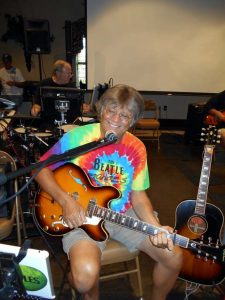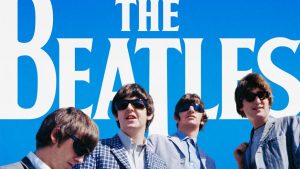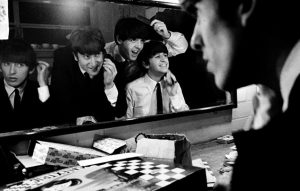
The Beatles invaded America in 1964 and on Sept. 15, The Villages Beatlemaniacs Club will invade the Rialto Theatre in Spanish Springs Town Square.
That’s the day the Ron Howard’s Beatles’ documentary film, “Eight Days A Week: The Touring Years,” debuts in the U.S.
“We’re going to have at least 90 people at the 5 o’clock showing of the film,” said Jim Fraser, head of the Beatlemaniacs. The group has about 500 members and meets every Friday from 10 a.m. until noon at Odell Recreation Center.
“I can’t wait to see this film and I think most people feel the same way,” Fraser said. “People who have seen it told me there is a lot of new video and audio of the Beatles. But even people who are not fans of the Beatles should see this movie. The Beatles aren’t just a band; they’re part of our history.”
Just about every baby boomer can remember when the Beatles first appeared on “The Ed Sullivan Show,” in February, 1964.
Here is a trailer for the film:
Ron Howard, the Academy Award winning director, takes a look at the rise and touring years of the Beatles from 1962, until the band stopped doing live concerts in 1966.

The movie was produced with the full cooperation of Paul McCartney, Ringo Starr, John Lennon’s widow, Yoko Ono Lennon, and George Harrison’s widow, Olivia Harrison.
“I’m excited to tell the astounding story of these four young men who stormed the world in 1964,” Howard said in a press statement. He was playing a young Opie Taylor on the “Andy Griffith Show” when the Beatles were touring. “Their impact on popular culture and the human experience cannot be exaggerated.”
Fraser thinks Howard – who won an Oscar for directing “A Beautiful Mind” – is an ideal choice to chronicle the Beatles touring years.
“He’s Opie, right?” Fraser said. “He grew up with the Beatles and is a big Beatles fan.”
These were life-defining years for the Beatles and their fans. The 1962-66 era details the Beatles from scruffy rockers in Liverpool to the most influential force in music and popular culture.
“The Beatles coming to America surely changed my life,” said Ted Skolits, a Villager who is drummer for Dawn DiNome and the Flashback Band. “My parents were not into rock and roll; I was brought up by my father’s favorite big bands: Benny Goodman and Glenn Miller. Being a drummer, my idols were Gene Krupa and Buddy Rich. After seeing the Beatles, Ringo was my idol.”

Kids loved the Beatles but adults didn’t quite understand the fuss.
“My Dad let us watch the show, although he didn’t like the Beatles,” Skolits said. “What I remember mostly from that first performance was that they all had the same hairstyle and the way they shook their hair when they shouted ‘ woooo’. My Dad said ‘all they do is say ‘yeah..yeah.. yeah — anybody can do that.’ All I knew is that I wanted a Ludwig drum set, just like Ringo’s.”
Skolits later discovered something special about Starr.
“From a technical standpoint, most of Ringo’s drumming was not that difficult to play but some of his rhythms took some time to figure out. I only recently realized he was a left-handed drummer playing on a drum set meant for right-handed drummers. That is one reason his drumming patterns are so unique.”
Just about everything about the Beatles during those years was unique.
They were transformed from lovable mop-tops – “I Want to Hold Your Hand” — to outspoken rebels, most notably John Lennon’s “more popular than Jesus” remark.
McCartney describes that period this way in the film: “By the end it became quite complicated, but at the beginning, things were really simple.”
So it was in America, evolving from those innocent days of the early 60s. By the end of 1966, the country was divided by the Vietnam War; urban riots, drug use and the generation gap.
In 1967, after the touring stopped, the Beatles focused on recording in the studio with producer George Martin. They created such experimental, artistic landmark albums as “Sgt. Pepper’s Lonely Hearts Club Band,” and the so-called “White Album” using everything from sitars, to backward tracks and recorded sound effects.
“In those days you couldn’t reproduce those kinds of songs live on stage,” Fraser said. Also, the freshness and fun of the early years disappeared.
“After Ed Sullivan, everything was new in America and they loved it,” Fraser said. But the pressure of constant touring, making records and coping with criticism became overwhelming, even dangerous. “We were kids and we were scared,” McCartney says in the film, which notes the Beatles played 166 concerts in 15 countries and 90 cities around the world.
This was an era, when the Beatles would play big stadiums with small amps and no giant video screens. Lennon said they couldn’t hear themselves on stage.
“The technology just wasn’t there in those days,” Fraser said. Instead of focusing just on music, a Beatles concert became “an event” Fraser said.
McCartney in the film admitted the band wasn’t as tight or focused on stage. “The Beatles were the show, the music wasn’t,” he said.” We all started to get pretty fed up. We were looking for somewhere new to go.”
George Harrison puts it this way in the film: “We were normal and the rest of the world was crazy.”
Although the Beatles post-touring career produced some of the band’s most iconic music, Fraser prefers those earlier songs.
“I’m a big fan of the older stuff,” he said. “It moves me emotionally and takes me back to my youth.” One of Fraser’s favorite albums is “Rubber Soul,” that came out late in 1965. “I think that was a real sign of change and growth,” he said.
“Rubber Soul” had such classic and diverse songs as Lennon’s moody and introspective “Norwegian Wood,” with Harrison on sitar. Lennon reveals emotional depth on “In My Life,” one of the most powerful and moving Beatles songs. McCartney was in a romantic mood on “Michelle,” and played some folk rock on “I’m Looking Through You.” Harrison created some jangly pop on “If I Needed Someone” and Ringo offered a country take on “What Goes On.”
It’s the stuff of genius and that’s why the Beatles have endured for countless new generations.
“It’s the music that matters,” Fraser said. “That’s why people are still talking about this band that broke up almost 50 years ago.”

